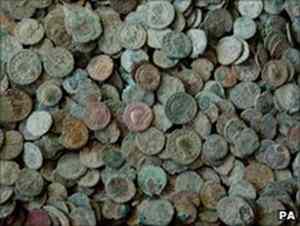Coins from the largest Roman coin hoard ever discovered in a single vessel are set to go on display at Frome Library.
There will also be a chance to meet Dave Crisp who discovered the hoard, as well as archaeologists from the British Museum and Somerset County Council.
 The discovery has also highlighted to detectorists the importance of working with local archaeology services.
The discovery has also highlighted to detectorists the importance of working with local archaeology services.
As a result of this successful joint approach, it's hoped this will further encourage both sides to work together.
'Special pains'
The coin hoard was discovered by Dave Crisp, who previously discovered a dispersed silver coin hoard in the same field in the Frome area.
Because of his actions, the jar containing 52,000 Roman coins, was left unspoilt so that archaeologists could excavate it properly without causing damage to the find.
Since the discovery in late April, experts from the Portable Antiquities Scheme at the British Museum have been working through the find.
For Somerset County Council's local finds liaison officer, Anna Booth, the find has been a model example of how a treasure should be reported to the authorities.
"The best thing has been Dave's actions in reporting the hoard straightaway and a lot of fellow metal detectorists have already picked up on this aspect of it so I know from a lot of my colleagues that the word has got out that Dave acted exactly as he was supposed to do."
"A lot of people have seen how we've been able to work together really well - Dave was not excluded from it, he was there on the excavation and helped us with it, we kept him involved at all points along the process."
Although Dave's find was done by the book, the problem of night-hawking still remains, where detectorists break the law by trespassing on private land in the hope of finding ancient treasures.
This also causes further pressures for legitimate metal detectorists who get permission from landowners to scour the land.
"That is a fear that a lot of metal detectorists face, they have a lot of pressures from landowners of the sites not to reveal find spots because of problems like night-hawking.
"With big finds like this, which is a treasure case, we go to special pains to try and keep the find spot as closely hidden as possible, we're happy to tell people it's come from the Frome area but we don't want to be too precise about it because of the risk."
Another problem is trying to monitor how active night-hawkers are in Somerset, as county council archaeologists openly admit they will be the last to know about it.
"It is a shame it does on, if you have a look on the internet, you'll find groups dedicated to night-hawking so people aren't always ashamed of what they do, or go to any pains to cover up their night-hawking activity, mainly because there's not much chance of prosecution for it.
"We're hoping to change that by working more closely with police to deal with any illegal metal detecting."
Some of the coins will go on public display, at Frome Library on Thursday, 22 July from 11am to approx 1pm.
Source: BBC [July 15, 2010]